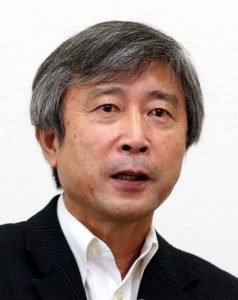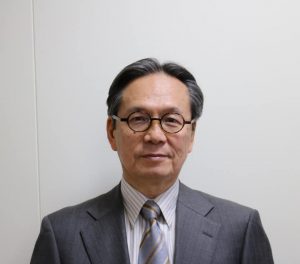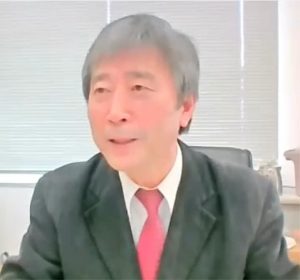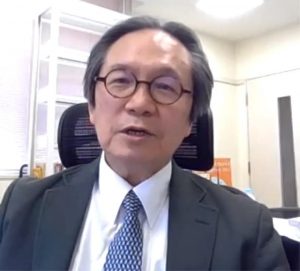Views on Ukraine invasion from A-bombed Hiroshima’s perspective: Hiroshima and Nagasaki peace organization leaders discuss choice between nuclear dependence and disarmament
Apr. 1, 2022
by Uzaemonnaotsuka Tokai, Senior Staff Writer
With the invasion of Ukraine by Russia, the path forward to achieving a ceasefire is still unclear. What should the global community do to prevent Russia from using nuclear weapons and limit the number of victims? On March 30, the Chugoku Shimbun invited Ryo Oshiba, director of the Hiroshima Peace Institute at Hiroshima City University (in the city’s Asaminami Ward), and Fumihiko Yoshida, director of the Center for Nuclear Weapons Abolition at Nagasaki University (located in Nagasaki City), to engage in an online discussion about such issues.
Ban of nuclear weapons as a global mindset
Concentrate wisdom on diplomatic solutions
How do you perceive Russia’s threat to use nuclear weapons?
Mr. Yoshida: I was shocked to learn that Russia’s leader, the person who initiated the act of aggression, had threatened to use nuclear weapons, inhumane implements of war. Until now, use of nuclear weapons had been taboo, and nuclear disarmament had been deliberated at multinational meetings, such as those involving the Nuclear Non-Proliferation Treaty (NPT). Russia’s behavior has trampled the rules and norms that had been fostered to that point in time.
The world now stands at a crossroads. Will we choose a world burdened by a dependence on nuclear weapons, or continue the trend that has prevailed to date in the direction of nuclear disarmament. Which path the world takes will be impacted by the future of the war in Ukraine and the post-war reconstruction of the international order.
Mr. Oshiba: The risk of nuclear weapons use is not non-existent at the moment. The world senses the danger that Russia’s threats could easily lead to nuclear war. Some have advocated to this point the theory of nuclear deterrence, by which the possession of nuclear weapons in a balanced way is seen as the key to maintaining global stability. The weakness of that theory, however, has become clear. Nuclear weapons are nothing more than a tool for intimidation.
How do you see the future of ceasefire negotiations going forward?
Mr. Oshiba: News reports have mentioned that negotiations are making progress, but we are not yet out of the woods. If Ukraine is made a neutral nation without membership in the North Atlantic Treaty Organization (NATO), how will a security framework be established? Furthermore, who will oversee the situation of human-rights protection on the Crimean Peninsula, which is now under Russia’s effective control? As deliberations on several such issues are required, an immediate ceasefire is out of reach at this point.
Mr. Yoshida: When the lives, livelihoods, and human rights of the Ukrainian people are considered, the most urgent task is to realize a ceasefire at all costs. However, reaching a ceasefire will be difficult at this time. No country should adopt a lenient stance vis-à-vis Russia, a country that serves as a permanent member on the United Nations’ Security Council and the party that initiated this war of aggression. The international community must harness its collective wisdom to demand an end to the military action and reach a diplomatic solution.
What are your thoughts on the idea of nuclear deterrence, a concept that has gained momentum in some countries following the invasion of Ukraine?
Mr. Oshiba: Some people are of the mindset that Ukraine was invaded because it had abandoned its nuclear weapons. But it is ridiculous to directly link that idea to the current invasion. Ukraine possessed nuclear weapons in the era of the former Soviet Union, but nuclear warheads were removed from the country by 1996. It is therefore absurd to immediately connect such past events to Russia’s current invasion.
Mr. Yoshida: As a conditioned response to the threat represented by Russia, I can imagine some people might advocate that their own country should possess the same nuclear weapons. That idea is based on the fear of nuclear weapons. It is a reflexive posture, with the idea being that the adversary would be deterred from attacking them, and the world would remain stable.
However, the situation this time is different. One man, Russian President Vladimir Putin, has demonstrated he can initiate a war at his discretion, and with that the risk of nuclear weapons use instantly increases. All of which means that, under such conditions, the nuclear deterrence theory, whereby security is maintained by responding to nuclear weapons with other nuclear weapons, simply does not work. In fact, NATO has yet to intervene militarily in the Ukraine situation, while Western countries have increased their non-military pressure. Whether or not these actions will succeed remains to be seen. However, in the future, the placement of nuclear disarmament as the most important pillar of global security needs to be clearly enunciated. Ultimately, international law must define what nuclear disarmament means and limit dependence on nuclear weapons.
Mr. Oshiba: I agree. Military aggression needs to be handled as a political and diplomatic issue with a priority on humanitarian perspectives. The world is being tested by current circumstances about what kind of international order should be established from this point on. The people of the A-bombed cities of Hiroshima and Nagasaki should advocate that it is not acceptable for Russia to continue its war of aggression and threat of nuclear weapons use, let alone their actual use. For the international community, establishing this notion as the norm is crucially important. The key to achieving this end is increasing the number of states parties to the Treaty on the Prohibition of Nuclear Weapons, a framework that comprehensively bans nuclear weapons, from their development to use.
Ryo Oshiba
Born in Hyogo Prefecture in 1954. Graduated from the law school at Hitotsubashi University. Earned a doctorate in political science from Yale University in the United States. Appointed to his current position in April 2019 after serving in posts that include assistant professor at Sophia University’s faculty of law, director and vice president of Hitotsubashi University, and director of Aoyama Gakuin University’s International Center. His specialty is international relations.
Fumihiko Yoshida
Born in Kyoto City in 1955. Graduated from the University of Tokyo’s faculty of letters. Earned a doctorate in international public policy at Osaka University. After joining the Asahi Shimbun, he served as an editorial writer and deputy director of the Asahi Shimbun's Editorial Board, among other posts. Appointed to his current position in April 2019 after serving as a visiting professor at International Christian University (ICU), among others. His specialty is nuclear disarmament and non-proliferation policy.
(Originally published on April 1, 2022)
With the invasion of Ukraine by Russia, the path forward to achieving a ceasefire is still unclear. What should the global community do to prevent Russia from using nuclear weapons and limit the number of victims? On March 30, the Chugoku Shimbun invited Ryo Oshiba, director of the Hiroshima Peace Institute at Hiroshima City University (in the city’s Asaminami Ward), and Fumihiko Yoshida, director of the Center for Nuclear Weapons Abolition at Nagasaki University (located in Nagasaki City), to engage in an online discussion about such issues.
Ryo Oshiba, 68, director of Hiroshima Peace Institute, Hiroshima City University
Ban of nuclear weapons as a global mindset
Fumihiko Yoshida, 66, director of Center for Nuclear Weapons Abolition, Nagasaki University
Concentrate wisdom on diplomatic solutions
How do you perceive Russia’s threat to use nuclear weapons?
Mr. Yoshida: I was shocked to learn that Russia’s leader, the person who initiated the act of aggression, had threatened to use nuclear weapons, inhumane implements of war. Until now, use of nuclear weapons had been taboo, and nuclear disarmament had been deliberated at multinational meetings, such as those involving the Nuclear Non-Proliferation Treaty (NPT). Russia’s behavior has trampled the rules and norms that had been fostered to that point in time.
The world now stands at a crossroads. Will we choose a world burdened by a dependence on nuclear weapons, or continue the trend that has prevailed to date in the direction of nuclear disarmament. Which path the world takes will be impacted by the future of the war in Ukraine and the post-war reconstruction of the international order.
Mr. Oshiba: The risk of nuclear weapons use is not non-existent at the moment. The world senses the danger that Russia’s threats could easily lead to nuclear war. Some have advocated to this point the theory of nuclear deterrence, by which the possession of nuclear weapons in a balanced way is seen as the key to maintaining global stability. The weakness of that theory, however, has become clear. Nuclear weapons are nothing more than a tool for intimidation.
How do you see the future of ceasefire negotiations going forward?
Mr. Oshiba: News reports have mentioned that negotiations are making progress, but we are not yet out of the woods. If Ukraine is made a neutral nation without membership in the North Atlantic Treaty Organization (NATO), how will a security framework be established? Furthermore, who will oversee the situation of human-rights protection on the Crimean Peninsula, which is now under Russia’s effective control? As deliberations on several such issues are required, an immediate ceasefire is out of reach at this point.
Mr. Yoshida: When the lives, livelihoods, and human rights of the Ukrainian people are considered, the most urgent task is to realize a ceasefire at all costs. However, reaching a ceasefire will be difficult at this time. No country should adopt a lenient stance vis-à-vis Russia, a country that serves as a permanent member on the United Nations’ Security Council and the party that initiated this war of aggression. The international community must harness its collective wisdom to demand an end to the military action and reach a diplomatic solution.
What are your thoughts on the idea of nuclear deterrence, a concept that has gained momentum in some countries following the invasion of Ukraine?
Mr. Oshiba: Some people are of the mindset that Ukraine was invaded because it had abandoned its nuclear weapons. But it is ridiculous to directly link that idea to the current invasion. Ukraine possessed nuclear weapons in the era of the former Soviet Union, but nuclear warheads were removed from the country by 1996. It is therefore absurd to immediately connect such past events to Russia’s current invasion.
Mr. Yoshida: As a conditioned response to the threat represented by Russia, I can imagine some people might advocate that their own country should possess the same nuclear weapons. That idea is based on the fear of nuclear weapons. It is a reflexive posture, with the idea being that the adversary would be deterred from attacking them, and the world would remain stable.
However, the situation this time is different. One man, Russian President Vladimir Putin, has demonstrated he can initiate a war at his discretion, and with that the risk of nuclear weapons use instantly increases. All of which means that, under such conditions, the nuclear deterrence theory, whereby security is maintained by responding to nuclear weapons with other nuclear weapons, simply does not work. In fact, NATO has yet to intervene militarily in the Ukraine situation, while Western countries have increased their non-military pressure. Whether or not these actions will succeed remains to be seen. However, in the future, the placement of nuclear disarmament as the most important pillar of global security needs to be clearly enunciated. Ultimately, international law must define what nuclear disarmament means and limit dependence on nuclear weapons.
Mr. Oshiba: I agree. Military aggression needs to be handled as a political and diplomatic issue with a priority on humanitarian perspectives. The world is being tested by current circumstances about what kind of international order should be established from this point on. The people of the A-bombed cities of Hiroshima and Nagasaki should advocate that it is not acceptable for Russia to continue its war of aggression and threat of nuclear weapons use, let alone their actual use. For the international community, establishing this notion as the norm is crucially important. The key to achieving this end is increasing the number of states parties to the Treaty on the Prohibition of Nuclear Weapons, a framework that comprehensively bans nuclear weapons, from their development to use.
Ryo Oshiba
Born in Hyogo Prefecture in 1954. Graduated from the law school at Hitotsubashi University. Earned a doctorate in political science from Yale University in the United States. Appointed to his current position in April 2019 after serving in posts that include assistant professor at Sophia University’s faculty of law, director and vice president of Hitotsubashi University, and director of Aoyama Gakuin University’s International Center. His specialty is international relations.
Fumihiko Yoshida
Born in Kyoto City in 1955. Graduated from the University of Tokyo’s faculty of letters. Earned a doctorate in international public policy at Osaka University. After joining the Asahi Shimbun, he served as an editorial writer and deputy director of the Asahi Shimbun's Editorial Board, among other posts. Appointed to his current position in April 2019 after serving as a visiting professor at International Christian University (ICU), among others. His specialty is nuclear disarmament and non-proliferation policy.
(Originally published on April 1, 2022)











